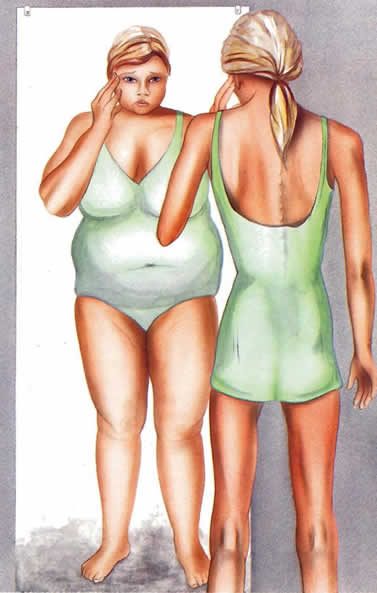The thing about a disorder like anorexia is that it eventually makes you look something like what the dominant culture regards as most beautiful, and achieving that ‘look’ becomes more important than, say, staying alive.
And it’s perfectly socially acceptable–for the most part–to tell skinny people how ‘good’ they look. When I was 17 and recovering from major thoracic and spinal surgery, I returned to school fragile and emaciated from the ordeal, only to hear “Oh my God, you lost so much weight–you look so good!!!”
Only a few sane, mature adults registered the appropriate shock and concern at my wasted appearance. Our culture is so sick that we think “sick” looks “so good!!! Anorexics are even praised for their self-discipline.

On the flip side, it’s seldom recognized that many people who are obese are actually suffering from an illness–compulsive eating disorder–that is often moralized as a lack of self-discipline.
It’s the unglamorous eating disorder. Because while thin people are praised, fat people are scorned. There are cries of war against ‘obesity’ from the highest places in the land while the Goddess of Thin gathers more and more worshipers to herself.
One thing I know is that we are all more than we look like; that we all are beautiful, marvelous, and perfect even in our brokenness because we are made by a God who is beautiful, marvelous, perfect, and who became broken like us to redeem that brokenness.
It would be better for all of us if we could stop keeping score–my disorder’s prettier than yours!–and give grace to one another. A great place to do that is in the breaking of bread, together.
Compulsive Eating Disorder is marked by:
- Binge eating, or eating uncontrollably even when not physically hungry
- Eating alone due to shame and embarrassment
- Awareness that eating patterns are abnormal
- Withdrawal from activities because of embarrassment about weight
- Eating little in public, but maintaining a high body weight
as well as other characteristics. If you suspect that you or someone you love may have a form of this disorder, please know that there is help and hope.











